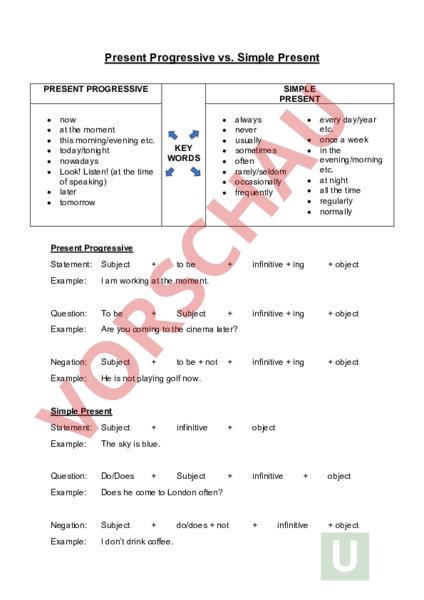Arbeitsblatt: Simple present vs. Present progressive
Material-Details
Hilfsblatt Simple Present vs. Present Progressive: Übersicht und Übungen zur Unterscheidung von Gewohnheiten, Fakten, regelmäßigen Handlungen (Simple Present) und aktuellen, vorübergehenden Handlungen oder Plänen (Present Progressive). Geeignet für verschiedene Klassenstufen, auch als Übungsblatt, Nachhilfe oder Wiederholung.
Stichworte: Englisch, Grammatik, Zeiten, Simple Present, Present Progressive, Present Continuous, Übungen, Arbeitsblatt, klassenübergreifend.
Englisch
Grammatik
klassenübergreifend
2 Seiten
Statistik
213544
210
0
17.09.2025
Autor/in
Manu Shaqe
Land: Deutschland
Registriert vor 2006
Textauszüge aus dem Inhalt:
Present Progressive vs. Simple Present PRESENT PROGRESSIVE • • • • • • • • SIMPLE PRESENT now at the moment this morning/evening etc. today/tonight nowadays Look! Listen! (at the time of speaking) later tomorrow KEY WORDS • • • • • • • • • always never usually sometimes often rarely/seldom occasionally frequently • • • • • • every day/year etc. once week in the evening/morning etc. at night all the time regularly normally Present Progressive Statement: Subject Example: am working at the moment. Question: To be Example: Are you coming to the cinema later? Negation: Subject Example: He is not playing golf now. to be infinitive ing object infinitive ing object infinitive ing object infinitive object Subject infinitive Subject to be not Simple Present Statement: Subject Example: The sky is blue. Question: Do/Does Example: Does he come to London often? Negation: Subject Example: dont drink coffee. do/does not infinitive object object Present Progressive 1. We use the present progressive tense for activities that are happening just now. am learning English at the moment. You are not listening. 2. We use it for an action happening about this time (today, this week), but not necessarily at the moment of speaking. It is temporary activity. am staying at the hotel. They are not coming today. Simple Present 1. We use the present simple tense for activities that happen again and again (everyday, sometimes, ever, never, etc.). sometimes go to school by bike. You dont speak Spanish. 2. We use it for facts that are always true. Lions eat meat. Our planet moves around the sun.
